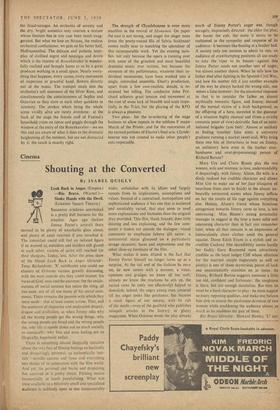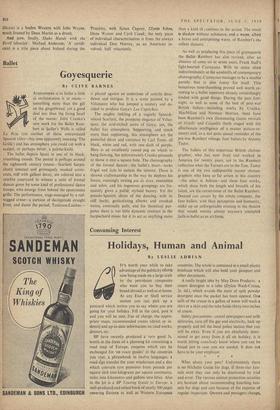Cinema
Shouting at the Converted
By ISABEL QUIGLY
Look Back in Anger. (Empire.) —Rio Bravo. (Warner.)—
Shake Hands with the Devil.
(Leicester Square Theatre.) SMASHING windows unrebuked is a pretty dull business for the smasher. Ages ago (before Jimmy Porter's arrival) there seemed to be plenty of smashable glass about, and plenty of adult reaction if you smashed it. The iconoclast could still feel an isolated figure if he wanted to, outsiders and insiders still glared at each other, victims of satire still reached for their shotguns. Today, less. After the press show of the filmed Look Back in Anger (director : Tony Richardson; 'X' certificate) you could see clusters of Osborne victims gravely discussing, with the most outside airs they could muster, his views of God, man and the universe; for the inside- outness of social opinion has taken the sting, all too. soon, out of all too inany of his social com- ments. There remains the passion with which they were made : that at least comes across. That, and the moments of imprecise and undirected despair, disgust and disillusion, as when Jimmy asks why all the wrong people get the wrong things, why the wrong people are loved and the wrong people die, why life is upside down not so much socially as cosmically; why fate and even feeling are so illogically, hopelessly unfair.
There is something almost illogically intrusive about the very fact of filming feelings so hectically and despairingly personal, so authentically 'out- side'—outside success and fame and everything one thinks of in connection with the film world. And yet, the personal and hectic and despairing has survived in it pretty intact. Filming means (numerically at least) popularising. What was once available to a relatively small and specialised audience is suddenly open to one immeasurably wider, unfamiliar with its idiom and largely remote from its implications, assumptions and values. Instead of a centralised, metropolitan and sophisticated audience it has one that is scattered and unreliably varied, that may seem to need more explanations and footnotes than the original play provided. This film, thank heaven, does little diluting and less explaining, and the few com- ments it makes are outside the dialogue—visual comments to emphasise (above all) satire: a sentimental statue glimpsed on a particularly savage occasion; faces and expressions and the other close-up furniture of the film.
What makes it seem diluted is the fact that Jimmy Porter himself no longer turns up as a surprise. At the tail end of the fashion he once set, he now comes with a manner, a voice, opinions and grudges we know all too well; already we know the reactions he sets up, the sacred cows he (only too effectively) helped to demolish; indeed, the angry young man, cosseted till his anger looks like petulance, has become a stock figure of our society, with its cult of the misfit—even of the gaolbird who publishes misspelt articles in the literary or glossy magazines. When Osborne wrote the play already much of Jimmy Porter's anger was, though savagely, imprecisely directed : the older the play, the busier the cult, the more it seems to be cushioned in the sympathy and response of its audience : it becomes like beating at a feather bed. A society only too anxious to admit its sins, an audience of cra*thumping penitents all too ready to take the viper to its bosom—against this Jimmy Porter needs not another sort of anger, but almost another theme. When he tells how his father died after fighting in the Spanish Civil War, and how his mother felt it just another example of the way he always backed the wrong side, one senses a false moment : for the emotional response to that is to consider the father an almost mythically romantic figure, and Jimmy, instead of the normal victim of a drab background, as the offspring of a hero, aureoled in the glamour of a situation highly unusual and (from a strictly romantic point of view) desirable. Son of an inter- national brigader (you feel)! Almost as unlikely as finding (another false note) a university graduate running a market sweet-stall. Why bring these two bits of literariness to bear on Jimmy, an unliterary hero even in the (rather over- handsome and over-prepossessing) person of Richard Burton?
, Mary Ure and Claire Bloom play the two women, wife and mistress; in love, understandably if despairingly, with Jimmy. Alison, the wife, is a dimly realised but credible character and allows Miss Ure to make use of her .face (eloquent of weariness from start to finish) in the almost un- bearably tormented scenes when Jimmy inflicts on her the results of his rage against everything else. Helena, Alison's friend whose ferocious antagonism towards Jimmy turns to love, is less convincing: Miss Bloom's strong personality manages to suggest at the time a more solid and interesting character than in fact you remember later, when all that remains is an impression of immaculately clean clothes amid the general squalor. Dame Edith Evans is a stylish and in- credible Cockney (the incredibility seems hardly her fault); Gary Raymond most attractively credible as the loyal lodger Cliff whose affection' for the married couple (separately as well as jointly) is one of those mysterious pieces of luck one unaccountably stumbles on at times. As Jimmy, Richard Burton suggests someone a little too old, confident and fortunate : the toughness is there, but not enough desolation. But then he must be a hard character to play : he must suggest so many opposing qualities, and make one believe him able to arouse the pasionate devotion of two women while maddening the audience almost as much as he maddens the pair of them.
Rio Bravo (director : Howard Hawks; '1.1' cer-
tificate) is a leaden Western with John Wayne, much livened by Dean Martin as a drunk.
And pow, finally, Shake Hands with the Devil (director : Michael Anderson; 'A' certifi- cate) is a trite piece about Ireland during the Troubles, with James Cagney, Glynis Johns, Dana Wynter and Cyril Cusak; the bnly piece of individual characterisation is from the always individual Don Murray, as an American in- volved, half reluctantly.







































 Previous page
Previous page